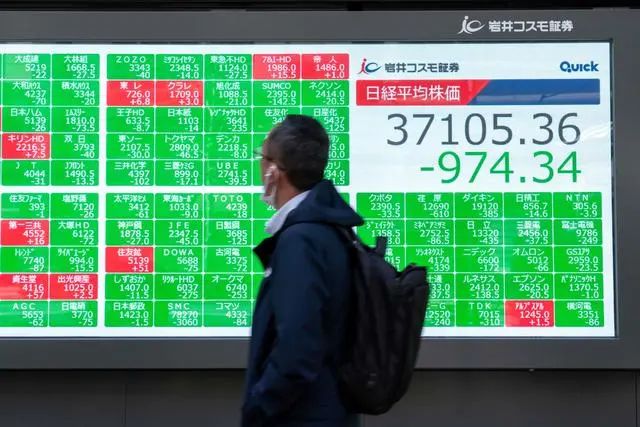Giving up on interest rate cuts, the US throws cold water on global stock markets
![]() 08/12 2024
08/12 2024
![]() 582
582
Commenting on auto stocks for a week, observing the diverse auto market.
Last week, the Federal Reserve gave up on an opportunity to cut interest rates at its latest policy meeting, and subsequently, major stock market indexes from New York to London, Tokyo to Shanghai, all fell sharply, setting astonishing declines.
Especially in Asian stock markets, which experienced a "Black Monday", with major stock indexes generally suffering heavy losses, with Japanese and Korean stock markets falling particularly sharply, attracting attention.
Compared to Japan and Korea, other Asian stock markets fell less, mostly ranging between 4% and 1%. Among them, the FTSE Australia Index fell 3.68%, and the New Zealand stock market's NZ50 Index fell 1.51%. Although the A-share market was relatively restrained, it was still unable to escape the downward trend.
For the Japanese stock market, which led the decline in Asia, analysts believe that the main reason for the decline was the Bank of Japan's interest rate hike. On July 31, the Bank of Japan announced that it would raise the policy interest rate from 0% to 0.1% to around 0.25%. This is the first interest rate hike since the Bank of Japan ended its negative interest rate policy in March of this year. At the same time, the Bank of Japan plans to reduce the scale of government bond purchases.

Jin Han, an analyst at Huafu Securities, said that this marks a significant step forward for the Bank of Japan in normalizing monetary policy, and as the yen is an important low-interest financing currency in the global market, this interest rate hike was not fully anticipated by the market, triggering sharp stock market volatility.
It is worth mentioning that due to this impact, Asian tech stocks continued to decline, but Asian tech stocks remain a force to be reckoned with, despite suffering their longest single-week decline since the end of 2022.
"Given the still bright long-term outlook for AI, TSMC, Samsung Electronics, and SK Hynix remain attractive investment targets," said fund managers in the region.
TSMC, Samsung, and SK Hynix currently have a combined market value of $1.2 trillion, up from $312 billion a decade ago. According to calculations, their weight in the MSCI Emerging Markets Index has increased from less than 4% at the end of 2007 to nearly 15%.
Despite the sharp declines, analysts have raised their earnings expectations for major Asian chip stocks, unlike in the US, where expectations for chip stocks have been downgraded since the end of July.
Taking NVIDIA as an example, its share price fluctuates wildly, with daily market value fluctuations often reaching hundreds of billions of dollars, leading to rising risk aversion sentiment in the market. From July 17 to August 2, the Philadelphia Semiconductor Index fell 20.61%, far exceeding the declines of 5.66% for the S&P 500 and 9.36% for the NASDAQ Composite over the same period.
In terms of news, Warren Buffett's reduction in his Apple stake exacerbated the market's selling spree in tech stocks. Prior to this, the founders of several tech companies, including NVIDIA, had already reduced their stakes in their own companies, and a peak in financial investor reductions also occurred. Subsequent second-quarter reports showed that tech giants' financial outlooks fell short of expectations, and investors' scrutiny of AI monetization outcomes became stricter.
"The high valuations of AI concept stocks mean that the market has very high growth expectations for them, and even slightly lower-than-expected performance may trigger sharp declines in share prices. For example, although Microsoft's latest results exceeded expectations, its share price fell 8% after the announcement due to slowing growth in its cloud business. Due to excessive gains in the early stage, the huge profit-taking motivation can be realized at any time. Amazon's cloud computing business and net income in the second quarter exceeded analysts' expectations, but its share price still fell 8.78% after the announcement." A financial commentator analyzed.

While maintaining optimism, investors are also hedging their bets. This week, there has been a significant increase in hedging demand against further declines in TSMC and Samsung share prices, and the volatility skew of TSMC and Samsung share prices has climbed to near its most pessimistic level since last May.
In addition to the Bank of Japan's interest rate hike, rising expectations of a US economic recession are also seen as an important reason for the recent global stock market adjustment.
Data released by the US Department of Labor on August 2 showed that the US non-farm sector added just 114,000 jobs in July, with the unemployment rate rising 0.2 percentage points month-on-month to 4.3%, a new high since October 2021.
The relevant data triggered the economic recession indicator, the "Samuelson Rule," which defines an economic recession as occurring when the three-month moving average of the unemployment rate rises by more than 0.5 percentage points from its low point over the past 12 months, indicating that the economy has entered an early stage of recession.
On the day of the data release, the three major US stock indexes experienced panic selling, with the Dow Jones Industrial Average falling 1.51%, the S&P 500 falling 1.84%, and the NASDAQ Composite falling 2.43%.
Analysts believe that as expectations of a US economic recession intensify, the performance of US tech stars falls short of expectations, and the Bank of Japan tightens policy more than expected, overseas markets have recently entered risk-aversion mode, with increased stock market volatility.

Under the pressure of universal declines in peripheral markets, the A-share market, while experiencing increased volatility, has remained relatively resilient, fluctuating at a low level, with the Shanghai Composite Index fluctuating around 2900 points. Some optimistic voices in the market expect that the sharp decline in overseas assets combined with the appreciation of the RMB will lead to capital inflows into A-shares and Hong Kong stocks.
Analysts said that the sharp declines in peripheral markets were mainly due to the strong correlation between the currencies of relevant countries and the US dollar, while the RMB has a certain degree of independence and stability compared to the US dollar, so the A-share market was less affected. In addition, considering the current low valuation of A-shares, the continuous introduction of China's official policies to stabilize growth, and the increased activity of market funds, it is expected that the downside potential of the A-share market affected by peripheral markets will be limited.
On August 9, the three major A-share indexes opened higher but closed lower. By the close, the Shanghai Composite Index fell 0.27% to 2862 points, the Shenzhen Component Index fell 0.62%, and the ChiNext Index fell 0.98%, setting a new low since the adjustment began. More than 3,800 stocks fell, with a total trading volume of 563.1 billion yuan, down 56.8 billion yuan from the previous day.
In terms of market performance, Huawei's triple-folding screen phone was "exposed," driving up the concepts of flexible screens (folding screens) and 3D glass, with Xingxing Technology surging 20%. The real estate sector strengthened, with WorldUnion Properties Consultancy and Shenzhen Property Development (Group) surging to limits. Preparing for the production peak of the iPhone 16, the Foxconn concept was active, with Jintuo Co., Ltd. leading the gains. Consumer electronics, new urbanization, and 3D camera sectors led the gains.
For investors, the current environment is full of challenges and opportunities.
Strategically, experts recommend focusing on companies with strong growth potential and a solid business foundation, as well as exploring emerging areas such as AI.
Amid increasing global uncertainty, the relative attractiveness of RMB assets has increased, providing a new direction for cross-border capital flows and bringing stability and growth expectations to the A-share market. Although the market may continue to fluctuate at the bottom in the short term, domestic policy support and the stability of the RMB provide a foundation for market stabilization, indicating that domestically policy-driven investment opportunities may gradually emerge.
However, for global stock markets, analysts also advise against bottom-fishing easily. Kyle Rodda, Senior Market Analyst at financial website Capital.Com, said, "As investors are forced to sell assets to cover losses, we will continue to see large-scale deleveraging trends in global stock markets. Such selling speeds are indeed overwhelming, with many being panic sales, leading to nonlinear asset price reactions that are disproportionate to news developments."
Note: Some images are sourced from the internet. If there is any infringement, please contact us for removal.







